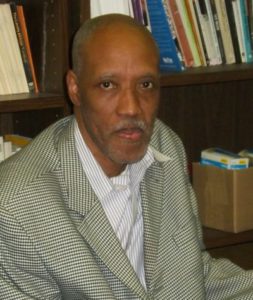Sinfree Makoni
Southern Multilingualisms
Saturday, March 14th 5:45 – 6:45

A central argument in many contemporary accounts of multilingualism is that language research has tended to work with monolingualism as a norm and that such a construct is inappropriate because a majority of people are multilingual. This argument, which celebrates the shift from monolingualism to multilingualism, does not, from the point of view of view of renewed interest in Southern multilingualisms do enough to question the underlying assumptions of its own position. It also underestimates the resilienceof a monolingual ideology at the heart of much research on language, and the resultant idea of enumerable multilingualism does not take us far enough. Even if we accept that that there has been a conceptual shift from a focus on monolingualism to multilingualism as reflected in the discourses of much established scholarship, a problem still remains with the idea of a ‘language’ as it reflects a complex interplay between contemporary and colonial interests. If,however, we grasp the full implications of theimpossibility of the central concept of language, it becomes clear that we cannot in fact critique and then pluralizemonolingualism. The next step, therefore, is to move toward an understanding of the relationship among language resources as used by certain communities (the linguistic resources that users draw on),local language practices (the use of these language resources in specific contexts), and language users’ relationshipsto language varieties (the social, economic, and cultural positioning of the speakers). From this point of view, we can start to move away from both mono-and multilingual orientations to language and take on board broad insights from outside the mainstream of language studies. Flexible notions of multilingualisms may lead us to generate concepts about language that are appropriate to the Global South and at the same timeliberate the Global North from rigid notions about language. The notion of Southern multilingualisms recognizes that not only are they many different kinds ofmultilingualisms but also that there are many different ways in which these language resources are interwoven and that it is, therefore, important to recognize that there are many different ontologies.
Sinfree Makoni is Professor of Applied Linguistics at The Pennsylvania State University (PSU). A native of Southern Africa, he did his undergraduate work in Ghana and received his Ph.D. in Applied Linguistics from the University of Edinburgh, Scotland, in 1989. Prior to PSU, he also held academic positions in South Africa, including Chair of Linguistics at the University of The Western Cape and Associate Professor of language and literature at the University of Cape Town; and he is former President of the Southern African Applied Linguistics Association. Dr. Makoni’s research spans a number of areas, including the socio-historical construction of colonial linguistics and postcolonial urban languages, anthropological approaches to health and aging in multilingual communities, police communication, discourses of militarization and terrorism, and the sociolinguistics of Arabic. Dr. Makoni’s many books include the co-edited collections Black Scholars on Black Languages: Problems and Possibilities(Routledge, 2002) and Disinventingand Reconstituting Languages(Multilingual Matters, 2007). His work has appeared in the pages of a wide variety of journals, such as Current Issues in Language Planning, Language Policy, Language in Society, Journal of Politeness Research, Journal of Multilingual and MulticulturalDevelopment, Language and Communication, Applied Linguistics Review, Journal of Language, Identity, and Education, or Journal of Cross-Cultural Gerontology. His work covers a diversity of geographies as well, such as Angola, Zimbabwe, Sudan, South Africa, Ghana, Kenya, or Brazil. His latest book is a monograph titled Innovations and Challenges in Applied Linguistics from the Global South,co-authored with Alastair Pennycook, newthis year with Routledge.
